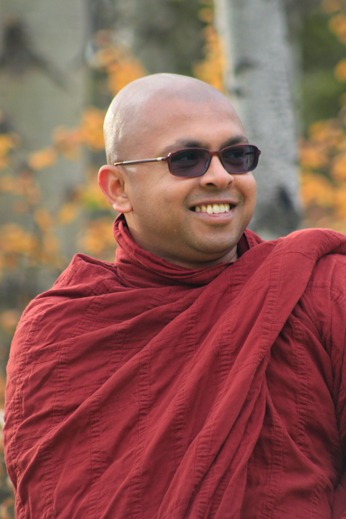What is ABMC
Bhante Kotawaye Suseela ( Abbot / Spiritual Adviser)
Venerable Kotawaye Suseela (also known as Bhante Suseela) was born in 1982 in Kotawaya village in the Hambantota District of southern Sri Lanka. At age 13, he renounced home and was ordained as a novice in 1995 at Jayasumanarama Maha Viharaya in Hakmana. Venerable Kotawaye Suseema and Venerable Diviyagaha Gnanananda were his preceptors (teachers). In 2002 he was ordained as Bhikkhu (higher ordained monk).
After completing his basic education, in 2001 he began some social activities with his fellows in Hakmana. He led the community in helping people in poverty. To sustain his charitable activities, he established an organization known as “Dahamdeepa Foundation (DDF)”. During this period the Foundation completed numerous charitable services in their community.
After dedicating himself for several years, Bhante moved to Colombo, the capital city of Sri Lanka, in 2005, and continued his further education. While he was in Colombo, he met a great meditation master and started to practice meditation. As a result of intense meditation practice, he was invited to a temple, Sri Lankaramaya, in Cyprus. In 2009 Bhante moved to Cyprus and conducted meditation programs as well as other religious activities.
In 2012, Bhante was invited by a Buddhist organization in Minnesota in the United States of America. He spent a few years with the American Buddhist community in Minnesota and performed services for the Buddhist community of Tennessee as well. Currently Bhante is the Abbot and Spiritual director of Alberta Buddhist Vihara Association (ABVA) and Alberta Insight Meditation Centre (AIM Centre) in Canada. While in Canada, Bhante served as the Buddhist chaplain at the University of Alberta (U of A) and the Northern Alberta Institute of Technology (NAIT). Bhante also extended his Dhamma services in India, Malaysia and Singapore. In March 2020, Bhante Suseela’s preceptor, the Abbot of Jayasumanarama Maha Vihara at Hakmana, passed away and Bhante Suseela was appoint as as the new Abbot.

A Buddha is one who has attained Bodhi; and by Bodhi is meant wisdom, an ideal state of intellectual and ethical perfection which can be achieved by man through purely human means. The term Buddha literally means enlightened one, a knower.
Buddha’s teachings are known as “dharma.” He taught that wisdom, kindness, patience, generosity and compassion were important virtues. Specifically, all Buddhists live by five moral precepts, which prohibit: Killing living things. Taking what is not given
Buddhism, founded in ancient India, is a spiritual philosophy centered on the teachings of Siddhartha Gautama, known as the Buddha. It emphasizes liberation from suffering through understanding the nature of reality, mindfulness, and ethical living. Core principles include the Four Noble Truths and the Eightfold Path. Meditation is a key practice.
Buddha’s teachings are known as “dharma.” He taught that wisdom, kindness, patience, generosity and compassion were important virtues. Specifically, all Buddhists live by five moral precepts, which prohibit: Killing living things. Taking what is not given
Anyone can become a Buddhist. You will need to take refuge in the Triple Gem and follow a ceremony during which you take a vow to uphold the Five Precepts (to not kill, not steal, not commit sexual misconduct, refrain from false speech and not take intoxicants that lessen your awareness).
Buddhist principles: Four Noble Truths (suffering, its cause, cessation, Eightfold Path), ethics, meditation, karma (cause and effect), reincarnation, compassion, non-attachment, impermanence (transience), Dharma (teachings). Aim: understand suffering, ethical living, inner growth, enlightenment.
Buddhism lacks a centralized leadership like other religions. Various Buddhist traditions have their own leaders. The Dalai Lama is a prominent figure in Tibetan Buddhism, while Theravada Buddhism may have senior monks. Sangha, the community of monks and nuns, plays a vital role in guidance and practice.
Meditation is a focused mental practice involving mindfulness or concentration. By calming the mind and observing thoughts, sensations, or breath, one cultivates awareness, clarity, and emotional balance. It promotes relaxation, self-awareness, and insight, and is integral to many spiritual and secular traditions for mental well-being.
The ultimate result of spiritual practice, such as in Buddhism, is enlightenment or self-realization. It involves transcending suffering, gaining deep wisdom, and attaining a state of inner peace and liberation from the cycle of birth and death. This realization brings profound understanding of reality and profound transformation of the self.

